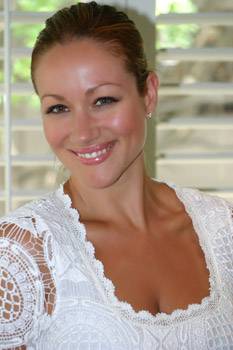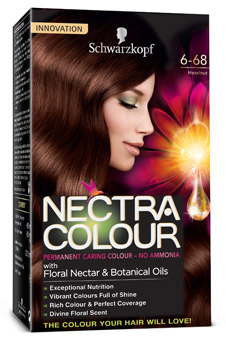Jaime Fronzek Hair Health Interview

Jaime Fronzek Hair Health Interview
The next generation in at-home colour Schwarzkopf launches Nectra Colour
Rich in goodness, this unique formula enables better colour penetration inside the hair cuticle to repair, nourish and condition the cortex, while at the same time providing the ultimate brilliance in colour.
Designed for permanent colouration, it contains a plethora of nourishing ingredients including amino acids to improve elasticity and Vitamin A & E to soften hair. With a divine floral scent, the floral nectar delivers exceptional nutrition for added shine and care, resulting in up to 90% less hair breakage* and intensified colour.
With the added benefit of grape seed oil, which has a high amount of fatty acids to provide moisture for brittle hair as well as apricot kernel oil to enhance shine and smooth the hair surface, Nectra Colour guarantees to deliver high colour performance and care for both your hair and scalp.
'Nectra Colour is a revolution in at-home hair colour products. Not only does it provide 100% grey coverage, what makes it really unique is the fact that it's the next generation of caring oil with exceptional nutrition for the hair. The results are intense colour and shine as well as exceptionally healthy hair from the inside out," says Grant Withnell, National Technical Educator for Schwarzkopf.
Schwarzkopf Nectra Colour is available in Coles, Priceline and Pharmacies at RRP $15.99 in 12 shades:
1. Black 1-0
2. Blue Black 2-2
3. Dark Brown 4-0
4. Chocolate Brown 4-68
5. Dark Cherry 4-99
6. Natural Brown 5-0
7. Chestnut Brown 5-68
8. Light Brown 6-0
9. Hazelnut 6-68
10. Intense Red 6-88
11. Praline blonde 8-45
12. Nougat Brown 6-62
Interview with Jaime Fronzek
Question: How important is our diet to hair health?
Jaime Fronzek: Our diet is essential to hair health because the way we nourish our body over time will provide the building blocks for strong, healthy, shiny hair and ultimately determine the quality of our hair.
Question: How does our hair reflect a bad diet?
Jaime Fronzek: A bad diet will affect our hair in a number of ways. Deficiencies in certain nutrients may affect the circulation delivering nutrients to the scalp and hair follicle causing a dry and flaky scalp. Nutrient deficiencies such as iron, protein and omega-3s may cause hair loss and for hair to become brittle, dry and break more easily and for hair to lose its lustre and shine.
 Question: What types of foods should we be adding to our diet if we want healthier hair?
Question: What types of foods should we be adding to our diet if we want healthier hair?
Jaime Fronzek: Meat, poultry, fish, eggs, dairy, pulses, beans and tofu provide protein and zinc which form the building blocks for hair. Meat in particular provide an excellent source of iron, which carries oxygen to our hair follicles and oily fish like salmon, tuna and trout are rich in omega 3 fatty acids are found in all of our cells providing strength and shine to the hair. Orange pigmented fruit and vegetables such as sweet potato and carrots provide vitamin A that produce and protect the oils in the hair. Wheat germ, nuts and seeds and their oils provide vitamin E help to nourish the scalp and oranges, kiwi, berries, tomato and broccoli provide vitamin C maximising circulation to the scalp and hair follicles. Finally whole grains and potato provide a mineral called silica, which gives lustre to the hair.
Question: Are there certain supplements that help with our overall health, especially our hair?
Jaime Fronzek: Supplements are only necessary if nutrient requirements can't be met through diet alone. Vegans and vegetarians or those who don't eat fish may be susceptible to deficiencies and may need to supplement with fish oil, iron, zinc and silica, which is a great supplement for hair health and is found in specific hair and nail formulas.
Question: How long will it take for hair health to increase after taking these supplements?
Jaime Fronzek: Hair health takes some time to improve after taking supplements, ultimately it is the healthy new hair that will most benefit so taking supplements and maintaining a healthy diet is a long-term commitment.
Question: What foods should we be increasing in our diets coming into the colder months?
Jaime Fronzek: Stodgy foods tend to be a stronger focus in our diet in the colder months and our fruits and veg can drop off because salads are less appealing and summer fruits are no longer available. In particular for hair health, maintaining a diet rich in orange fruit and vegetables likes carrots and sweet potato, green leafy vegetables for iron and vitamin c and making sure our 'stodgy' foods are from a wholegrain source like wholegrain bread, brown rice and oats.
Question: If we find that during winter we are always picking up colds – what supplements can we start taking now to prepare ourselves?
Jaime Fronzek: If you're susceptible to picking up colds, there are a number of supplements you can take such as vitamin C and zinc. Garlic and echinacea have evidence to show they can help reduce the severity and duration of a cold if you feel it coming on. There are supplements formulas containing all of these nutrients in one dose designed especially for cold season.
Question: We are constantly being told how good breakfast is for us. What are your top breakfast tips?
Jaime Fronzek: There is no doubt breakfast is a very important meal and that's because it sets up our eating for the remainder of the day. My top tips for breakfast are:
Eat breakfast within 2 hours of waking
Include protein and complex carbohydrate. Carbs are our fuel that lift blood sugar levels and help us concentrate, like wholegrain breads, flakey cereals and oats. Proteins like dairy and eggs help us feel fuller for a longer period of time so we don't go grabbing muffins with our mid-morning coffee.
If you are not a breakfast lover, at the very least, a smoothie, a piece of fruit or a piece of toast will do.
Question: Can you talk us through what you snack on, during the day?
Jaime Fronzek: I have a few favourite sweet and savoury snacks I rotate around for mid-morning and mid-afternoon depending on what I feel like, how hungry I am and where I am. Fat-free natural yoghurt with a sprinkle of muesli, nuts and seeds or berries or wholegrain crackers with cottage cheese, natural peanut butter or a boiled egg is great if I'm particularly hungry. For a grab and go snack on the run, fresh fruit or some nuts, seeds or trail mix in a zip lock bag is great to have rattling around my handbag.
Question: True or false: we should be consuming six small meals a day instead of three large meals?
Interview by Brooke Hunter
MORE






